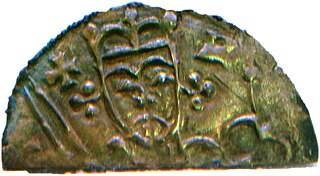
Sweyn Estridsson Ulfsson was King of Denmark from 1047 until his death in 1076. He was the son of Ulf Thorgilsson and Estrid Svendsdatter, and the grandson of Sweyn Forkbeard through his mother's line. He was married at least two times, and fathered 20 children or more out of wedlock, including the five future kings Harald Hen, Canute the Saint, Oluf Hunger, Eric Evergood, and Niels.

Eric I, also known as Eric the Good, was King of Denmark following his brother Olaf I Hunger in 1095. He was a son of Sweyn II. His mother's identity remains unknown. He married Boedil Thurgotsdatter.

Niels was the King of Denmark from 1104 to 1134. Niels succeeded his brother Eric Evergood and is presumed to have been the youngest son of King Sweyn II Estridson. King Niels actively supported the canonization of Canute IV the Holy and supported his son Magnus after he killed his rival for the succession, Knud Lavard. His secular rule was supported by the clergy. Niels was killed in an ensuing civil war and succeeded by Eric II Emune.

Margaret Sambiria was Queen of Denmark by marriage to King Christopher I, and regent during the minority of her son, King Eric V from 1259 until 1264. She is the first woman confirmed to have formally ruled as regent of Denmark. She was the reigning fief-holder of Danish Estonia in 1266–1282.

Princess Louise of Denmark and Norway was born to Frederick V of Denmark and Louise of Great Britain. Her eldest daughter, Marie of Hesse-Kassel, was the wife of Frederick VI of Denmark.

Anne Sophie von Reventlow was Queen of Denmark and Norway from 1721 to 1730 as the second wife of Frederick IV of Denmark and Norway.

Philippa of England, also known as Philippa of Lancaster, was Queen of Denmark, Norway and Sweden from 1406 to 1430 by marriage to King Eric of the Kalmar Union. She was the daughter of King Henry IV of England by his first spouse Mary de Bohun and the younger sister of King Henry V. Queen Philippa participated significantly in state affairs during the reign of her spouse, and served as regent of Denmark from 1423 to 1425.
Ingrid Ragnvaldsdotter was born a member of the Swedish royal family, became a member of Danish royalty by marriage and later was Queen consort of Norway as the spouse of Harald IV of Norway. Married four times, Ingrid had a number of children who played prominent roles in Swedish and Norwegian history.

Sophia of Denmark was Queen of Sweden as the consort of King Valdemar.

Princess Wilhelmina Caroline of Denmark and Norway, was the Landgravine consort of Hesse-Kassel and later the Electress of Hesse-Kassel by marriage to William I, Elector of Hesse.

Malmfred of Kiev was a Norwegian and Danish queen consort, wife first to King Sigurd I of Norway and second to king Eric II of Denmark.

Juliana Maria of Brunswick-Wolfenbüttel-Bevern was Queen of Denmark and Norway from 1752 to 1766 as the second consort of King Frederick V of Denmark and Norway. She was mother to the prince-regent, Hereditary Prince Frederick of Denmark and Norway, and was herself de facto regent from 1772 to 1784. King Christian VIII of Denmark and every subsequent Danish monarch excluding Christian IX descends from her.

Estrid Svendsdatter of Denmark, was a Danish princess and titular queen, a Russian princess and, possibly, duchess of Normandy by marriage. She was the daughter of Sweyn Forkbeard and perhaps Gunhild of Wenden and half-sister of Cnut the Great. By Ulf Jarl, she was the mother of the later King Sweyn II Estridson and Beorn Estrithson. The dynasty that ruled Denmark in 1047–1412 was named after her. Though never a ruler or wife of a king, she was known in Denmark as queen during her son's reign.

Ingeborg Magnusdotter was Queen of Denmark by marriage to King Eric VI. She was the daughter of King Magnus Ladulås of Sweden and Helvig of Holstein.

Princess Anna Sophie of Denmark and Norway was the eldest daughter of King Frederick III of Denmark and Sophie Amalie of Brunswick-Lüneburg, and Electress of Saxony from 1680 to 1691 as the wife of John George III.

Helvig of Schleswig was the queen of Denmark as the spouse of King Valdemar IV. She was the mother of Queen Margaret I of Denmark.

Jutta of Saxony was Queen of Denmark as the wife of King Eric IV of Denmark. She was the daughter of Albert I, Duke of Saxony. She married king Erik in 1239, and became junior queen consort, since her husband was junior king, even though there was no senior queen at the time. She would become senior queen in 1242.

Tyra of Denmark was a 10th-century Danish princess. She was the spouse of both King Olav I of Norway and of Styrbjörn Starke, prince of Sweden.

Princess Caroline of Denmark was the eldest surviving daughter of King Frederick VI of Denmark. She was unofficially known as "Kronprinsesse Caroline" prior to her marriage, and later as "Arveprinsesse Caroline". She married her father's first cousin, Hereditary Prince Ferdinand, who was heir presumptive to the throne from 1848 to 1863.
Cecilia Knudsdatter of Danmark, was a Danish princess, daughter of Canute IV of Denmark and Adela of Flanders.


















